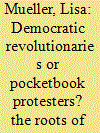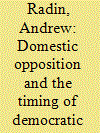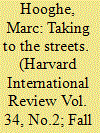|
|
|
Sort Order |
|
|
|
Items / Page
|
|
|
|
|
|
|
| Srl | Item |
| 1 |
ID:
120984


|
|
|
|
|
| Publication |
2013.
|
| Summary/Abstract |
This article investigates whether political or economic grievances were the main driver of the mass demonstrations in Niger in 2009-10, which occurred at a time of famine and the President's attempt to defy the constitution and seek a third term in office. Using original survey data from a quasi-random sample of Niamey residents, the article shows that low prospects of upward mobility are associated with a higher likelihood of protest participation, whereas opposition to the President's anti-constitutional politics is not. Membership in civic organizations is also associated with higher protest participation, but not because these groups are effective at framing the issues: what matters is the capacity of organizations to mobilize individuals. This suggests that civil society may have a galvanizing effect on citizens, even if efforts to win hearts and minds fail. The article concludes that the uprisings were driven mainly by economic grievances, thus contradicting international perceptions of the protests as a public outcry for democracy and casting doubt on the motivations behind supposedly pro-democracy movements, especially in contexts where autocracy and poverty coincide.
|
|
|
|
|
|
|
|
|
|
|
|
|
|
|
|
| 2 |
ID:
153938


|
|
|
|
|
| Summary/Abstract |
A substantial literature urges delaying elections and liberalization in postwar societies. There is little work, however, on when and how international missions that intend to delay elections and the transfer of sovereignty, such as those in Kosovo and Iraq, are able to do so. To fill this gap, I propose a theory that identifies conditions under which two forms of domestic opposition—elite objections and mass demonstrations—can at times force the international community to adopt an earlier transition plan. Following the predictions of the theory, I show that international occupations in Kosovo and Iraq were only able to implement their preferred transition plans when conditions were unfavorable for domestic opposition: when the absence of centralized authority within key groups makes an elite boycott unlikely, and when international policy does not threaten a major group's nationalist goals, making the emergence of widespread mass demonstrations doubtful. The implication for policy is that attempting to delay elections and liberalization is only advisable when domestic opposition is unlikely to be effective.
|
|
|
|
|
|
|
|
|
|
|
|
|
|
|
|
| 3 |
ID:
116119


|
|
|
|
|
| Publication |
2012.
|
| Summary/Abstract |
Last winter, a wave of mass demonstrations suddenly broke the surface calm of Russian politics. A new middle class, born of the oil-based prosperity of the last decade, took to the streets to voice its opposition to the perceived corruption of the political elite, especially United Russia, the ruling party of then Prime Minister Vladimir Putin. For a time, as the protest movement gained momentum, the very foundations of the regime appeared to shake. But in the March 2012 presidential election, Putin managed to win comfortably in the first round, and despite widespread charges of manipulation, even the opposition conceded that he had earned a convincing victory.
|
|
|
|
|
|
|
|
|
|
|
|
|
|
|
|
| 4 |
ID:
119902


|
|
|
|
|
| Publication |
2012.
|
| Summary/Abstract |
Since 2011, various European countries have experienced periods of intensive political turmoil, with mass demonstrations that have sometimes turned violent. The high level of mobilization contradicts the often-expressed idea that young generations are no longer interested in politics, but hit the hardest by the economic downturn, the youth are most motivated to mobilize themselves.
|
|
|
|
|
|
|
|
|
|
|
|
|
|
|
|
|
|
|
|
|